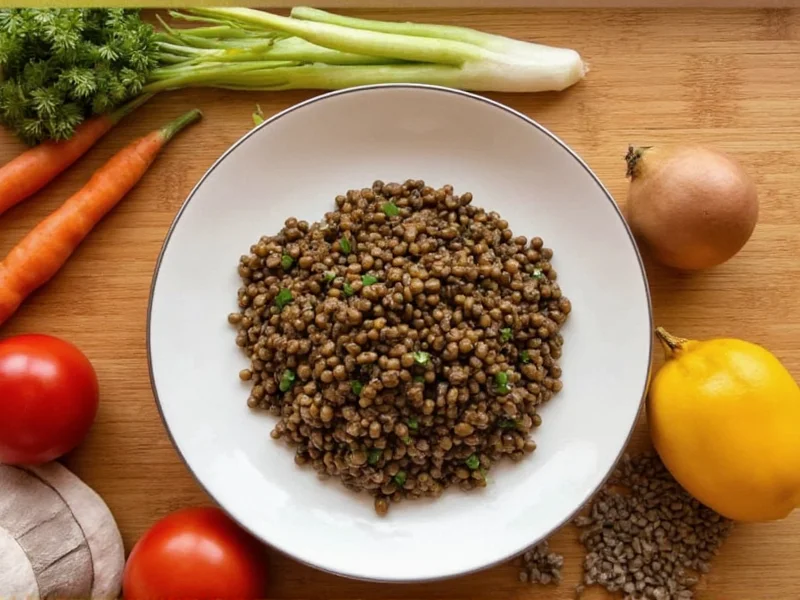Parboiling lentils is a valuable cooking technique that offers flexibility in meal preparation while maintaining optimal texture. Unlike full cooking, parboiling partially cooks lentils just enough to soften them slightly while preserving their structure for future use. This method is particularly useful for meal preppers, professional kitchens, and home cooks who want to streamline their cooking process without sacrificing quality.
What Exactly Is Parboiling Lentils?
Parboiling (partial boiling) involves briefly cooking lentils in boiling water, then immediately stopping the cooking process. This differs from full cooking where lentils are simmered until completely tender. The goal of parboiling is to achieve a "just-started" state where lentils have absorbed some water and begun to soften, but still maintain their shape and firmness.
Professional chefs and meal prep enthusiasts use this technique to create a cooking "head start" while preserving the ability to control final texture. When you're ready to complete your dish, parboiled lentils typically require just 5-10 minutes of additional cooking rather than the standard 20-30 minutes needed for raw lentils.
Why Parboil Lentils Instead of Fully Cooking?
Several practical benefits make parboiling lentils worth considering for your cooking routine:
- Time efficiency - Reduces final cooking time when preparing meals
- Texture control - Prevents overcooking when adding lentils to soups or stews
- Meal prep friendly - Allows you to prepare lentils in advance for quick assembly meals
- Consistent results - Eliminates variables in cooking time due to lentil age or water hardness
- Batch cooking - Enables cooking large quantities that can be frozen for later use
Step-by-Step Guide to Perfectly Parboiled Lentils
Follow these precise steps for consistently excellent parboiled lentils every time:
- Sort and rinse - Spread lentils on a clean surface to check for debris, then rinse thoroughly in a fine-mesh strainer under cold water
- Water ratio - Use 3 cups of water for every 1 cup of lentils (add 1 teaspoon salt per quart of water)
- Bring to boil - Use a large pot to prevent boiling over
- Add lentils - Once water reaches a rolling boil, add lentils and set timer immediately
- Parboil duration - Cook for specific time based on lentil type (see table below)
- Shock cooling - Drain immediately and plunge into ice water for 2-3 minutes
- Drain thoroughly - Shake well in strainer to remove excess water
- Store properly - Transfer to airtight container with paper towel to absorb moisture
| Lentil Type | Parboiling Time | Texture After Parboiling | Best Uses |
|---|---|---|---|
| Red/Yellow Lentils | 2-3 minutes | Slightly softened, edges beginning to break | Curries, purees, quick soups |
| Green/Brown Lentils | 5-7 minutes | Firm but less crunchy, skin intact | Salads, stews, casseroles |
| Black Beluga Lentils | 6-8 minutes | Distinctly softened but holding shape | Garnishes, elegant salads |
| French Green Lentils | 7-9 minutes | Firm with slight resistance | Specialty dishes, gourmet preparations |
Common Parboiling Mistakes to Avoid
Even experienced cooks sometimes make these errors when learning how to parboil lentils for meal prep:
- Skipping the ice bath - Without shocking in cold water, lentils continue cooking from residual heat and become mushy
- Overcrowding the pot - Using too many lentils in too little water leads to uneven cooking
- Adding salt too late - Salt should be in the water from the beginning for proper seasoning
- Not draining thoroughly - Excess moisture causes lentils to steam and overcook during storage
- Parboiling for too long - Remember, the goal is partial cooking, not complete tenderness
Storage Methods for Parboiled Lentils
Proper storage ensures your parboiled lentils maintain quality until you're ready to use them:
Refrigeration: Store in an airtight container with a paper towel to absorb moisture for up to 5 days. Change the paper towel daily if condensation appears.
Freezing (best method for long-term storage): Spread parboiled lentils in a single layer on a parchment-lined baking sheet and freeze for 1 hour. Transfer to freezer bags, removing as much air as possible. Properly frozen parboiled lentils maintain quality for 6-8 months.
When using frozen parboiled lentils, add them directly to your dish without thawing - they'll complete cooking in just 5-7 minutes. This makes them perfect for quick weeknight meals when you're following a step by step guide to parboiling lentils for efficient cooking.
Culinary Applications for Parboiled Lentils
Parboiled lentils shine in various cooking scenarios where time or texture control matters:
- Salad preparation - Complete lentil salads in under 10 minutes by adding parboiled lentils to dressed greens
- Soup assembly - Add parboiled lentils during the last 5-10 minutes of soup cooking to prevent mushiness
- Meal prep containers - Combine with proteins and vegetables for ready-to-heat lunches
- Emergency pantry meals - Keep frozen parboiled lentils on hand for quick nutritious meals
- Dinner party shortcuts - Reduce last-minute cooking stress by preparing lentils in advance
Professional chefs particularly value parboiled lentils when creating dishes that require precise texture control. The method ensures lentils maintain their integrity in complex dishes where full cooking would lead to undesirable mushiness.











 浙公网安备
33010002000092号
浙公网安备
33010002000092号 浙B2-20120091-4
浙B2-20120091-4